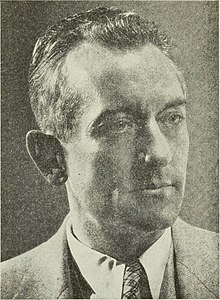Loading AI tools
American journalist, author and screenwriter From Wikipedia, the free encyclopedia
Gene Fowler (born Eugene Devlan) (March 8, 1890 – July 2, 1960) was an American journalist, author, and dramatist.
Gene Fowler | |
|---|---|
 | |
| Born | Eugene Devlan March 8, 1890 Denver, Colorado, U.S. |
| Died | July 2, 1960 (aged 70) |
| Occupation(s) | Journalist, author, screenwriter |
| Spouse | Agnes Hubbard |
| Children | 3, including Gene Fowler Jr. |
Fowler was born in Denver, Colorado. When his mother remarried during his youth, he took his stepfather's name to become Gene Fowler. Fowler's career had a false start in taxidermy, which he later claimed gave him a permanent distaste for red meat. After a year at the University of Colorado, he took a job with The Denver Post.[1] His assignments included an interview with the frontiersman and Wild West Show promoter Buffalo Bill Cody. He established his trademark impertinence by questioning Cody about his many love affairs. He was also known for his racy, readable content and for the speed of his writing.[2]
He left Denver for Chicago and met Ben Hecht and Charles MacArthur.[1] He eventually moved to New York where Fowler worked for the New York Daily Mirror, New York Evening Journal and as managing editor of the New York American and The Morning Telegraph.[2][1] At The Morning Telegraph his staff included Hecht, MacArthur, Ring Lardner, Westbrook Pegler, Martha Ostenso, Walter Winchell and Nellie Revell.[1] He was also newspaper syndication manager for King Features.
He began writing books and his third, The Great Mouthpiece, about the attorney William J. Fallon, became a bestseller and got him noticed by Hollywood where he became one of the highest paid screenwriters. His work included more than a dozen screenplays, mostly written in the 1930s, including What Price Hollywood? (1932), The Call of the Wild (1935) and Billy the Kid (1941). He collaborated with Bess Meredyth on a stage play, The Mighty Barnum, which was later filmed, and also with Ben Hecht on the play The Great Magoo.[2]
During his years in Hollywood, Fowler became close to such celebrities as John Barrymore and W. C. Fields. Fields, whose animus toward children is legendary, claimed that Fowler's sons were the only children he could stand. He wrote a biography of Barrymore as well as Mack Sennett, Jimmy Durante and New York City mayor Jimmy Walker.[2]
In 1916, Fowler married Agnes Hubbard, and they had three children, the eldest of whom was Gene Fowler Jr. (1917–1998), a prominent Hollywood film editor (whose work included It's a Mad, Mad, Mad, Mad World and Hang 'Em High) and a sometime director (1957's I Was a Teenage Werewolf as well as numerous television programs). Their other children were Jane and Will.[1]
Fowler died in West Los Angeles, California, aged 70 of a heart attack. Fowler had been writing a book based on his time as a New York newspaperman for over 5 years and had almost completed it before his death.[2][3] The book, Skyline, was published posthumously.
Fowler was the subject of many colorful anecdotes. One told by his son Will, concerns a scene outside of John Barrymore's hospital room in May 1942.
A stranger entered the waiting room where [John] Decker and Fowler were sitting with reporters. "I am a healer," cried the stranger. "Just give me three minutes with Mr. Barrymore and I will cure him!" There was a moment of silence until Fowler arose, snatched the seemingly demented fellow by the scruff of his collar and threw him down the stairs, calling after him, "Physician, heal thyself!"
Fowler was present at Barrymore's death, and he claimed (perhaps not seriously) that Barrymore's last words, spoken to Fowler, were: "Is it true that you're the illegitimate son of Buffalo Bill?"
Fowler wrote many witticisms both spoken and written. Two regarding the art of writing might suffice:
Fowler wrote or co-wrote screenplays for the following movies (partial list).
Other of his works that became the basis for films include his stage play The Great Magoo, which was filmed as Shoot the Works (1934), and the book Beau James: The Life & Times of Jimmy Walker, which was the basis for Beau James (1957).
Seamless Wikipedia browsing. On steroids.
Every time you click a link to Wikipedia, Wiktionary or Wikiquote in your browser's search results, it will show the modern Wikiwand interface.
Wikiwand extension is a five stars, simple, with minimum permission required to keep your browsing private, safe and transparent.